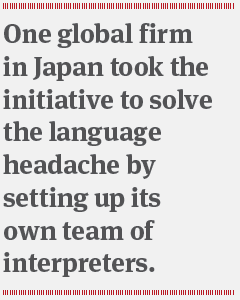Often it is said that global project management is a difficult task, “global” here meaning the project membership is cross-national, which requires a high level of internal collaboration. Unfortunately, there is no one-size-fits-all solution that can be applied to global projects to ensure their success, no matter how much you know about management methods and even if that includes the Project Management Body of Knowledge. This is because the fundamental issue is communication.
Project managers thus need to modify their management and communication style according to location requirements and those taking part in the task, remembering that each country and firm has its own culture. Based on the many global projects with which I have been involved, I would like to pass on some tips regarding communication aspects that I hope will make your project management life easier.
Consensus-building

Very important in Japanese culture is consensus-building among project stakeholders. One of the practices involved is nemawashi, the consultations held, among the parties involved in decision-making, before final choices are made.
Japanese society being group-oriented, its members tend to avoid intense broad-based discussions, preferring to initially discuss details about which project members can most easily agree.
While this approach may seem to require excessive amounts of time and effort, good communication between the project management and stakeholders does save time and money in the long run, because it obviates the need later to revise decisions.
Attention to detail
The detail-oriented mindset of Japanese and the many questions that may be asked come from wanting to make the right decisions by having all relevant information available. Many will ask about the background, goals, requirements and senior management wishes regarding a project, so that they fully understand the situation before deciding on a particular detail. This produces more accurate decisions and lessens the chance of future risks.

Nomi-nication
The Japanese tend to feel relaxed and enjoy discussing business over a few (alcoholic) drinks. Although this nomi-nication (communication over drinks) with colleagues, to keep up with current business discussions, is less popular among the younger generation, it works well for middle-aged and senior people. I know many engineers from India, for example, who go drinking with their Japanese colleagues here, but not with their co-workers in their own country.
Language barrier
Although it is vital that the individual managing global projects be a proficient speaker of English, such people are a scarce resource in Japan. One’s only option thus might be to select someone with an excellent understanding of business and a logical mindset. That said, one global firm in Japan took the initiative to solve the language headache by setting up its own team of interpreters.
In short …
Localisation should apply to business processes and communication style. When in Japan, do as the Japanese do.




